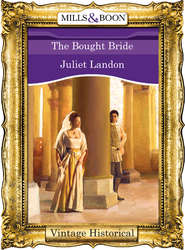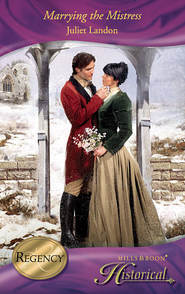По всем вопросам обращайтесь на: info@litportal.ru
(©) 2003-2024.
✖
A Scandalous Mistress
Настройки чтения
Размер шрифта
Высота строк
Поля
‘Mm…m,’ Amelie said. ‘Pretty, but…’
‘Well, then, what about a large salver? They’re always useful. One cannot have too many salvers, can one?’
The catalyst was the word ‘useful’. If there was anything a woman disliked being given for her birthday, it came into the ‘useful’ category unless, of course, she had asked for it. Like a carriage and a pair of horses. Eagerly, she looked around for the largest, the most tasteless and most expensive ‘useful’ item on display, though it was Caterina who spotted it first, a massive silver and gilt tea urn with three busty sphinxes holding up the bowl on their wings and a tap that swung away like a cobra about to strike. Standing on an ugly triangular base, it was a monstrous reminder of Lord Nelson’s recent victory in Egypt.
‘What if she doesn’t drink tea, though?’ whispered Caterina, without knowing how she and her aunt were working at cross-purposes. ‘It looks very expensive.’
All the better. ‘Oh, she’s sure to, dear.’
‘Is it in good taste?’ Caterina queried, having doubts.
Amelie was careful here. ‘It will depend,’ she said, cautiously, ‘on what their sister’s preferences are, I suppose. If she has a growing family and plenty of visitors, then a large urn will be just the thing.’ And it would go some way, she thought, towards mollifying her resentment at the insensitive, not to say inhuman, attitude of the two brothers who, she hoped, would not follow up their introduction with anything more presumptuous.
But although the purchase of the vastly overpriced and vulgar gift had evened the score for Amelie in one direction, there was yet a more serious one to consider, calling for a return home at a faster pace than their earlier ride into London. There was now no time to lose. ‘Lise, go and tell the footman we’re ready to go home,’ she said.
The stares of admiration directed at the beautiful coffee-coloured barouche and the Dalmatian running behind were only vaguely heeded on the return journey to Richmond, for the event that concluded their shopping spree weighed heavily on Amelie’s mind, making her realise yet again that, however good it was to be an independent woman, she was still vulnerable without the comforting support of her husband.
Sir Josiah Chester had been taken from her with a frightening suddenness two years ago, a most unusual two years that left her with few relatives close enough to assist her through the worst months, the problems of inheritance and estate. The only one of their number whose help had been constant and ungrudging was Sir Josiah’s younger brother Stephen, himself a widower with a young family, of whom Caterina was the eldest.
It had been to thank Stephen for his generous support that she had agreed to take Caterina with her when she moved down to Richmond. Had it not been for that debt which she owed him, for his plea, and for Caterina’s motherless state, she would have made the move alone, which had been her first intention. She had no wish to stay in the Derbyshire town of Buxton for, although she had been happy enough there for her first twenty-two years, the two years after that had pointed out with brutal reality who she could depend on for true friendship.
Caterina’s joy at being taken to live with her, though flattering, was not what Amelie had wanted, and the inevitable conflict of interests had not been satisfactorily resolved in their first few weeks. Caterina had expected to make a new set of friends and to be received almost instantly into high society. Amelie had not the heart to explain either to Caterina or to her grateful father, that the fickleness of high society was something she would rather have shunned than sought, and that the reason she had chosen Richmond was for its proximity to Kew Gardens, to Hampton Court Palace, to the famed Chelsea Physic Garden and to Royal Academy exhibitions. The day’s shopping in London, though necessary, had been more the result of a guilty conscience than for Amelie’s own pleasure, not having tried as hard as she might to make contact with the local leading families, as Caterina had expected her to. The young lady’s very inadequate wardrobe had dictated the pattern of their shopping, and now the maid Lise sat beside a mountain of brown paper parcels that threatened to topple and bury her at each bounce of the carriage. Fortunately, there had not been room for the controversial tea urn, or Lise might have been critically injured.
The reason for Amelie’s accelerated haste to reach home was neither asked nor explained, as the clouding September sky was supposed by Caterina to be the cause. The truth, however, was more to do with Lord Elyot’s stated intention to attend directly to the problem of which the Vestry had complained.
Homeless mothers-to-be were often hustled over the boundary of one parish into the next, even during labour, to avoid the responsibility of more mouths to feed. Naturally, these women could not be let loose to give birth under hedges: untidy activities of that nature did not look well where refined citizens could be shocked by such sights. As a last resort, they had to be rounded up until it was all over, by which time the problem was often solved more permanently.
Sir Josiah Chester had not retained his vast wealth by giving it away to charitable causes, but by saving it; whether it was the powerful combination of childlessness, bereavement and wealth that gave rise to Amelie’s concern for waifs, strays and hopeless debtors, she had never tried to analyse, but the fact was that her acceptance of her new state had been smoothed by the help she had given to others less endowed and more distressed by far. She could be distressed in comfort, while they could not.
With a name as well known in Buxton as Sir Josiah’s, it had been relatively easy for Amelie, as a widow, to pay the debts of poor families threatened by imprisonment and worse and to find employment for petty criminals. She had given shelter and aid, sometimes in her own home, to pregnant homeless women and had found suitable places for them afterwards, had persuaded farmers’ wives to take in starving children and had poured money into improving the local workhouse facilities. The legacy she had received from her own wealthy parents had been exceptionally generous, and all that giving had made a greater difference to her sense of worth and general well-being than it had to her reserve of funds.
As long as she was actively helping the Vestry in Buxton to deal with their problems, no one had stood in her way, though nothing could stop the gossip of society women concerning the status of a young, wealthy and beautiful widow and the attentions of her brother-in-law, of supposed lovers and supposed rivals. The whisperings of scandal. It had been time for her to leave.
But in Richmond, the advantages associated with the name of Sir Josiah Chester had not opened the same doors as they had before, and all the help she had given so freely in Buxton now had to be done rather differently. In the dark. Anonymously. By bribery and deception and, if need be, by the useful burglary skills of a servant in her employ. It went without saying that she had far too many servants, most of them without references.
Last night, she had promised a distraught and heavily pregnant young woman, via the woman’s equally distressed companion, that she would help to release her from the workhouse where she was about to be taken. Amelie fully intended to go there that very night, and the last thing she needed was an extra guard on the gate put there by the interfering Lord Elyot. What on earth could have possessed her to agree to an introduction?
She heard the aristocratic drawl again, smoother than northern tones, more languid, deep and perfectly enunciated. His teeth were good too, and she recalled how something inside her had lurched a little at the way his eyes had held hers, gently but with devastating assurance. They had not raked over her as so many other men’s did, trespassing and too familiar. No, they had almost smiled, telling her that there were things to be shared, given the opportunity.
Well, my fine lord, she thought, grinding her teeth, there will be no opportunity. I shall know how to steer well clear of you and any family who believe charity to be a waste of time. Hateful, arrogant people.
What colour were his eyes?
Pulling herself up sharply, she redirected her thoughts to the three over-endowed sphinxes and their hideous cobra companion, drawing the Kashmir shawl closer about her at the sudden chill.
After a later-than-usual dinner, after the unwrapping of every single purchase and an examination of each item, after umpteen reviews on the perfection of Lord Rayne’s neckcloth, his hair, his noble features, Caterina was at last persuaded to retire to bed with The Mysteries of Udolpho, which she had longed to read but had not been allowed to, for fear her younger sister Sara should want to do the same. Such were the joys of leaving one’s siblings behind.
Immediately, Amelie began a transformation from lady of fashion to dowdy old woman who might, in the dark, pass for a servant or an itinerant fruitpicker looking for work. She had seen the plight of the one to be rescued the day before, waiting, weeping outside the impressive Vestry Hall on Paradise Road, a grandiose Roman-style building that would have intimidated anyone by its sheer size alone. Amelie’s house was only a few doors away, and she and Caterina, passing on their way home from the apothecary’s shop, had been arrested by the pitying group of women who stood to sympathise and scold that the woman in question was being expected to walk all the way up to the workhouse on Hill Common. The woman’s companion, probably an aunt or her mother, had been shouldered aside by the beadle, but Amelie had managed to find out from her what was happening and to assure her, in a moment of extreme compassion, that she could rely on her help the very next night, one way or another.
Previous rescues had been undertaken by those of Amelie’s devoted servants who were themselves of a similar background to the women and, so far, she’d had no need to risk her own discovery, nor would they have allowed her to if she had proposed it. This time, she had kept her plans to herself, knowing that the woman’s companion would need to recognise her.
It was a fair hike up to Hill Common and a carriage would easily be identified so, instead of walking, she rode her donkey Isabelle. It was appropriate, she thought, confidently rejoicing that she was well ahead of that obnoxious man and his abortive schemes. What a pity it was that she would not see his reaction to the latest ‘springing of a young nobthatcher’. What disgusting jargon men used.
The road was uphill, rough, and well beyond the street lights, and the rain that had threatened all afternoon had begun to fall heavily, turning the stony way into a river and soaking the thick shawl over Amelie’s head. At last she came to the great iron gates and the gatekeeper’s box from which the dim glow of a candle could be seen wavering in the draught. Sliding thankfully off Isabelle’s back, she saw the dark figure of a woman approach and could hardly contain her relief that she would not have to wait long on such a night. Soon, they would all three be safe and comfortable, and the new life would be welcomed instead of being someone’s burden.
‘Well met,’ she said, peering hard into the blackness and easing her reticule off her wrist. ‘Have you heard how your…sister…is? Or is she your daughter? Do forgive me, I didn’t see you too well.’
‘Aye, she’s well,’ the woman croaked. ‘No babe yet, though.’
‘And have you spoken to the gateman? He’ll cooperate, will he? Do we have to bribe the doorman, too?’
‘Oh, aye, each one as we pass through. How much did you bring, m’lady? If you’ll pardon me asking.’
‘Let’s get out of this downpour…over here under the tree.’
The steady roar took on a different note as Amelie pulled the donkey behind her, then took the reticule out from beneath the folds of dripping wetness, turning her back on the woman to rest its weight on the saddle. It was in that brief moment of heed-lessness when Amelie should have been holding all her wits on a knife-edge that the woman’s hand darted like a weasel towards the bag of money, pulling it off the saddle and out of Amelie’s hands, swinging it away into an indistinct flurry of blackness.
Bumping into Isabelle’s large head, Amelie threw herself after the woman and made a wild grab at her clothes, feeling the resistance and the ensuing twist as her fingers closed over the rough wet fabric. Unable to see, the two of them grappled and pulled, suffering the frantic grasp of fingers on head, hair, shoulders and throat, their feet slithering and tripping over tree roots. But the woman was stronger and older than her opponent and trained to every trick of the seasoned thief, and Amelie was taken by the hair, spun round and pushed so hard that she fell sprawling upon her front in one great lung-crushing thud that pressed her face into the wet ground with a squeak of expelled breath.
The fight was over; the sound of fumbling, then of running feet on the track becoming fainter, and the unrelenting rain pattering noisily on the leaves above, throbbing like a pain, humiliating and raw. She had promised to help a woman in need and been robbed of the chance. Failure.
‘Isabelle…Isabelle?’ she called.
She heard the jingle of the harness and a man’s voice urging the creature to come on and be quick about it, then a soft thwack on the animal’s wet rump.
‘Who…where are you?’ Amelie called. ‘Who is it?’ She struggled to gain a footing, but her boots were tangled in folds of wet skirts and she was unable to rise before a dark shape bent down to help her.
‘Forgive me, ma’am,’ he said, politely. ‘Allow me to help you up. Hold your hands out…no…this way.’
‘Where? How do I know you’re a friend?’
‘Well, you don’t, ma’am. But you can’t stay down there all night, can you? See, here’s your donkey. Come, let me help you. Are you hurt?’
‘Not much. I don’t know. That woman’s nowhere to be seen, I suppose?’
‘Gone, I’m afraid. Has she robbed you, ma’am? Did she take…?’
‘My reticule. Yes, it’s gone. Tch! Serves me right.’
The stranger eased her up, releasing her arm immediately to look, as well as he was able, at the patch of ground round about. ‘No reticule, ma’am. It looks as if she must have taken it. I’d never have thought there’d be game-pullets like her out on a night like this, I must say. Shall I get hold of the gatekeeper for you?’
‘Er…no, not now,’ said Amelie, quickly. ‘I’d better go back and try again tomorrow. Thank you for your help, Mr…?’
‘Todd, ma’am. No trouble at all. Would you like me to escort you?’
‘Oh, no, thank you, Mr Todd. I’m most grateful to you, but I have not far to go and Isabelle will carry me.’
‘Well, if you’re sure. I’ll hold her while you climb aboard. There now. Good night to you, ma’am. I didn’t catch your name?’











